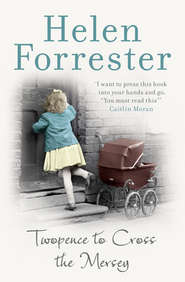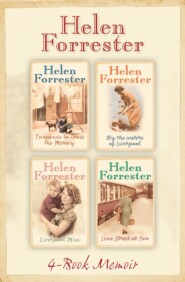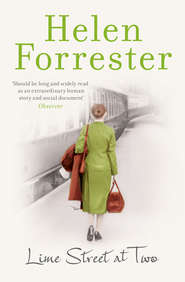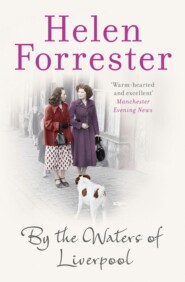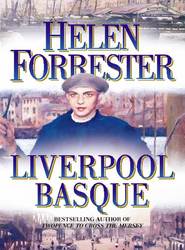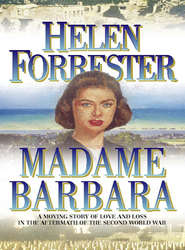По всем вопросам обращайтесь на: info@litportal.ru
(©) 2003-2024.
✖
Liverpool Miss
Настройки чтения
Размер шрифта
Высота строк
Поля
In a paroxysm of rage all the frustration came pouring out. I raved helplessly at them, and they raved back.
I was ungrateful, thoughtless, utterly selfish. Father and Mother worked all day to maintain the family. The least I could do was to keep house. And, anyway, no matter what happened, I could not become a shop assistant. It was beneath our station.
Beside myself with fury, I ranted that Mother was working in shops. Why could not I?
The boys, with long-suffering looks, went out to play with their friends. Avril burst into tears and howled nearly as loudly as me. At such times she would go so red that even her scalp under the fine golden hair and thick scurf would flush, and she would look as if she might at any moment drop dead from apoplexy.
Fiona snatched up her ancient doll and fled upstairs.
It was night school time, but still the argument raged. Finally, I could think of no more reasons why I should go to work and I sat on a paint can, buried my face in my hands and wept uncontrollably.
Mother angrily seized some of the dishes off the table and took them into the kitchen. Father folded up the newspaper into a neat small square, a habit he had. Suddenly the room was quiet, except for miserable sobs from Avril, sitting on the floor in a corner, sturdy small legs spread in front of her. Occasionally, she would kick the tiles with her heels, as if to emphasise her misery. My own sobs were almost silent; I had long ago learned to cry without drawing attention to myself.
Mother returned from the kitchen and Father said rather carefully to her, ‘Perhaps if Helen went to this shop for the interview and saw how much work a place like that would expect from her, she might realise that she is better off at home. Small places like that usually squeeze the very life blood out of their people.’ He ran one finger along the newspaper’s folds to neaten it, while I looked up quickly at Mother.
I swallowed a sob. Here was a tiny opening. I was sure I could do any amount of work. I conveniently ignored the fact that my physical condition was so poor that quite small exertions could make me dizzy, and each month I had to face a day of almost unbearable pain.
Between sniffs, I begged Mother in watery, meek tones, to let me do as Father suggested.
Mother had wearied herself with her tirade. She sat down suddenly and was quiet. Then she said resignedly that she had no work for the next day, so she supposed she might as well take me to see the shop. Fiona could look after Edward, since the following day was Saturday.
I had not considered that Mother might accompany me, and I had expected to have to face the interview alone. This had worried me, because I had no idea how one should behave or what one should say in such a situation, particularly as I did not want to give any indication of the kind of life we led. I felt instinctively that I would stand a better chance of getting work if it appeared that I came from a stable working class or lower middle class home, with less well-born parents than I had. What kind of an impact on a small businessman would Mother have, a lady who spoke ‘with ollies in her mouth’?
I sighed, but made no objection to her coming. I said instead, ‘I’d have to make myself look respectable, somehow.’
I looked at Mother hopefully. She was still dressed in her black business frock, though she had taken off her shoes and stockings and wore father’s old bedroom slippers on her feet. Her face looked haggard under her make-up and her hair, which I had waved the night before, was ruffled and untidy.
Mother returned my look. ‘Yes, you would,’ she replied, so sharply that it sounded like an implied threat and made me jump apprehensively.
I was as tall as Mother, though with a much slighter frame, and after surveying me for a moment, she said I could borrow the dress she was wearing. Since it would be Saturday the following day, I could also borrow Fiona’s black woollen stockings and black, flat-heeled shoes; Fiona was not consulted, and was very grumpy when she discovered what had been agreed. ‘You’ll tread them out,’ she complained. ‘Your feet are too big.’
‘I’ll be very careful,’ I promised, as I recklessly washed my hair and then the rest of me in a quart of hot water in the tin basin, and used up the last sliver of soap we possessed. There would be a row with the boys in the morning about the lack of soap, but it could be endured.
I borrowed from Mother the only pair of scissors we had. She carried them in her handbag, so that they could not be misused, but even so, they were blunt and the nails on my right hand had to be finished off by biting them. Toenails were always left to grow until they broke off, and sometimes they looked like cruel, yellow claws before they finally cracked off.
The scissors were too small to cut hair, so I combed my unkempt locks with the family comb, also normally carried in Mother’s handbag, and hoped they would stay off my face until the interview was over. When I received some wages, I promised myself, I would ask Mother if I could buy some hair clips.
Even after these efforts, I must have looked very odd in a black dress too long and too looose for me and without an overcoat, though it was late February and the weather was damp and chilly.
Full of hope, though shivering with cold, I trotted along beside Mother through the misty morning, past the Rialto Cinema and Dance Hall with its tawdry posters, and the dim outline of the cathedral, to the sweetshop.
It was a very little shop, in a shabby block of other small shops and offices. Its window, however, sparkled with polishing despite the overcast day. Through the gleaming glass I could dimly see rows of large bottles of sweets and in front of them an arrangement of chocolate boxes, all of them free of dust. Beneath the window, a sign in faded gold lettering advertised Fry’s Chocolate.
Mother, who had not spoken to me during the walk, paused in front of the shop and frowned. Then she swung open the glass-paned door and stalked in. I followed her, my heart going pit-a-pat, in unison with the click of Fiona’s shoes on the highly polished, though worn, linoleum within.
An old-fashioned bell hung on a spring attached to the door was still tinkling softly when a stout, middle-aged woman with a beaming smile on her round face emerged through a lace-draped door leading to an inner room.
‘Yes, luv?’ she inquired cheerfully.
‘I understand that you wrote to my daughter about a post in your shop?’ Mother’s voice was perfectly civil, but the word ‘post’ instead of ‘job’ sounded sarcastic.
The smile was swept from the woman’s face. She looked us both up and down uncertainly, while I agonised over what Mother might say next.
‘Helen?’ the woman asked, running a stubby finger along her lower lip.
‘Helen Forrester,’ replied Mother icily.
‘Ah did.’ The voice had all the inflections of a born Liverpudlian. She looked past Mother, at me standing forlornly behind her. Her thoughtful expression cleared, and she smiled slightly at me. I smiled shyly back.
I felt her kindness like an aura round her and sensed that I would enjoy being with her, even if she did expect a lot of work from me.
‘Have you ever worked before, luv?’ she asked me, running fingers on which a wedding ring gleamed through hair which was improbably golden.
I nodded negatively. Then cleared my throat and said, ‘Only at home.’
‘What work would Helen be expected to do?’ asked Mother, her clear voice cutting between the woman and me like a yacht in a fast wind. She had also the grace of a yacht in the wind; but the sweet-shop owner was obviously finding her more trying than graceful and answered uncertainly, ‘Well, now, I hadn’t exactly thought. I need a bit o’ help, that’s all. ’Course she’d have to wash the floor and polish it, like, every day. And clean the window and dust the stock. And when I knowed her a bit she could probably help me with serving, like. I get proper busy at weekends – and in summer the ice cream trade brings in a lot o’ kids, and you have to have eyes in the back o’ your head or they’ll steal the pants off you.’
Mother sniffed at this unseemly mention of underwear, and then nodded.
‘And what would the salary be?’
I groaned inwardly. I was sure that in a little shop like this one earned wages not a salary.
The beginning of a smile twitched at the woman’s lips, but she answered Mother gravely.
‘Well, I’d start her on five shillings, and if she was any good I’d raise it.’
Even in those days, five shillings was not much. The woman seemed to realise this, because she added, ‘And o’ course, she can eat as many sweets as she likes. But no taking any out of the shop.’
I could imagine that this was not as generous as it sounded. After a week of eating too many sweets, the desire for them would be killed and few people would want them any more.
Mother inquired stiffly, ‘And how many hours a week would she work for that?’
‘Well, I open up at half past seven in the morning to catch the morning trade, you understand. And I close up at nine in the evening.’ She paused a moment and then said, ‘But I wouldn’t need her after about seven o’clock. Me husband’s home by then, and he helps me after he’s had his tea. And I close Wednesday atternoons, so she’d have the atternoon off after she’d tidied up, like. Me husband helps me Sundays, too, so I wouldn’t want her then either.’
I wanted the job so badly that I did not care how many hours I worked, how often I scrubbed the floor. The shop seemed so lovely and warm, after our house, and I sensed that in a rough way the woman would be kind to me. I tried to will the woman to agree to take me.
A little boy burst through the shop door, leaving the bell tinging madly after him. He pushed past us and leaned against the corner of the counter.
‘Ah coom for me Dad’s ciggies,’ he announced, turning a pinched, grubby face up towards the sweet-shop owner.
‘Have you got the money?’
‘Oh, aye. He wants ten Woodbines.’ A small hand was unclenched to show four large copper pennies.
The cigarettes were handed over and the pennies dropped into the wooden till.
‘Now don’t be smoking them yourself,’ admonished the woman, with a laugh.






